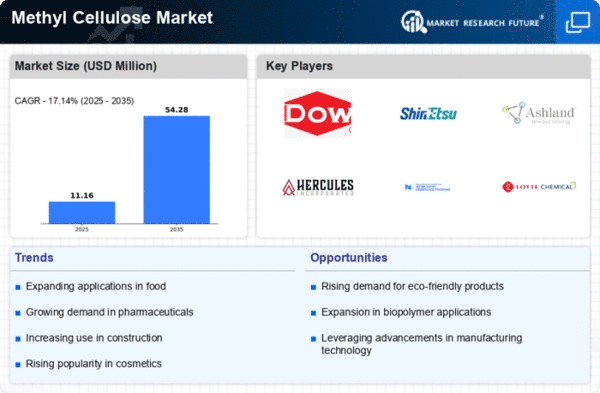Top Industry Leaders in the Methyl Cellulose Market
 Methyl cellulose, a versatile derivative of cellulose, stands as a testament to the endless possibilities offered by scientific ingenuity. This humble molecule, boasting properties like thickening, rheology control, and film formation, finds its way into diverse industries, from food and pharmaceuticals to construction and oil and gas. Navigating this dynamic landscape, however, requires a brushstroke of strategic finesse and an open mind to innovation.
Methyl cellulose, a versatile derivative of cellulose, stands as a testament to the endless possibilities offered by scientific ingenuity. This humble molecule, boasting properties like thickening, rheology control, and film formation, finds its way into diverse industries, from food and pharmaceuticals to construction and oil and gas. Navigating this dynamic landscape, however, requires a brushstroke of strategic finesse and an open mind to innovation.
Key Strategies Shaping the Market:
-
Product Diversification: Leading players like Ashland, Dow Chemical, and Shin-Etsu Chemical are constantly broadening their methyl cellulose portfolios, introducing novel grades and formulations tailored to specific end-use requirements. This differentiation caters to niche markets and fosters customer loyalty. -
Vertical Integration: Securing upstream control over key raw materials like wood pulp is crucial for ensuring stable supply chains and cost competitiveness. Companies like Nippon Yashi Chemical are actively pursuing vertical integration, gaining control over critical resources. -
Technological Advancements: Continuous research and development in novel manufacturing processes, cellulose modification techniques, and bio-based methyl cellulose options are vital for sustained growth. Hercules' recent breakthrough in using plant-based feedstock exemplifies this commitment to greener solutions. -
Geographic Expansion: Emerging economies like China and India present immense potential for methyl cellulose consumption. Companies like Sinopec Group are strategically building production facilities in these regions to capitalize on the growing demand. -
Sustainability Focus: Environmental concerns surrounding traditional production methods and the non-biodegradable nature of some methyl cellulose grades are pushing manufacturers towards eco-friendly alternatives. DuPont's focus on developing biodegradable and sustainably sourced methyl cellulose demonstrates this responsible approach.
Factors Dictating Market Share:
-
Brand Reputation and Reliability: Established players with proven track records like Eastman Chemical Company and AkzoNobel enjoy significant market share due to their brand recognition and consistent quality. However, innovative startups addressing specific applications can still carve out their space. -
Cost Competitiveness: Optimizing production processes and sourcing affordable raw materials are crucial for cost leadership. Asian manufacturers often have an edge due to lower labor costs, but premium brands command higher prices due to superior performance and environmental credentials. -
Distribution Network and Customer Service: Extensive distribution networks and prompt technical support are essential for customer satisfaction and repeat business. Companies like FMC Corporation excel in this area. -
Regulatory Landscape: Stringent environmental regulations, especially in Europe and North America, are pushing manufacturers towards bio-based and biodegradable methyl cellulose options. Adapting to evolving regulations and developing compliant products becomes crucial for market success.
Key Players:
Dow Chemical Company (U.S.), Ashland (U.S.), Sigma-Aldrich Co. LLC. (U.S.), Zhejiang Kehong Chemical Co. Ltd (China), BASF SE (Germany), LOTTE Fine Chemical (South Korea), Shin-Etsu Chemical Co., Ltd (Japan), Reliance Cellulose Products Ltd. (India), Zhejiang Kehong Chemical Co. Ltd. (China), J. RETTENMAIER & SÖHNE GmbH + Co KG (Germany) and others.
Industry News and Recent Developments:
August 2023: Dow Chemical unveils a new line of methyl cellulose grades specifically designed for high-performance coatings in the automotive industry, promising enhanced durability and scratch resistance.
September 2023: The Indian government announces plans to invest in infrastructure projects using eco-friendly building materials, including bio-based methyl cellulose for fiberboard production.
October 2023: The European Union proposes stricter regulations on plastic pollution, pushing manufacturers towards biodegradable alternatives like methyl cellulose for food packaging applications.
November 2023: Shin-Etsu Chemical partners with a leading pharmaceutical company to develop methyl cellulose-based excipients for controlled drug release in oral medications.
December 2023: A consortium of leading methyl cellulose manufacturers announces the formation of a research alliance to develop standardized quality control protocols and assess the environmental impact of their products.










